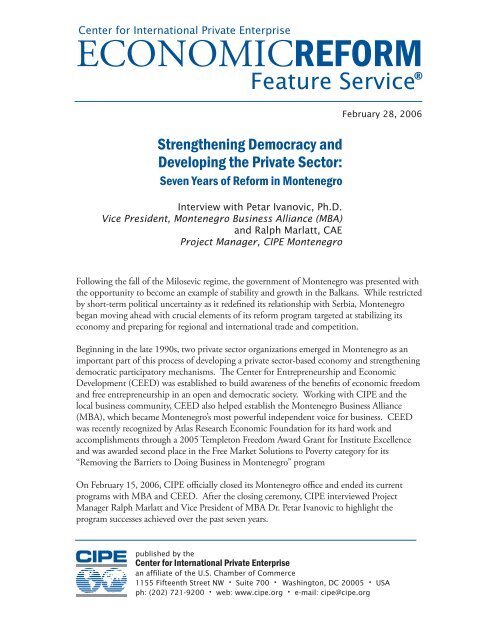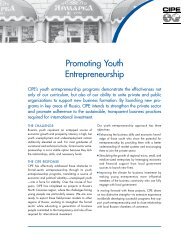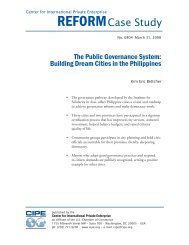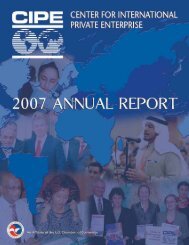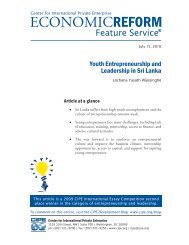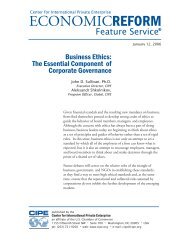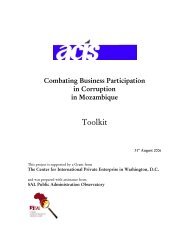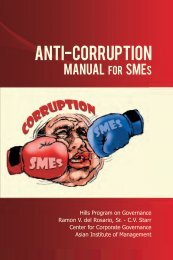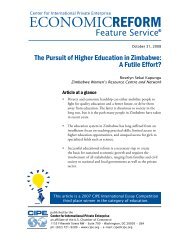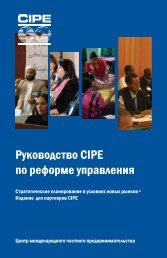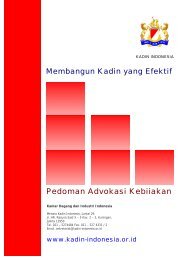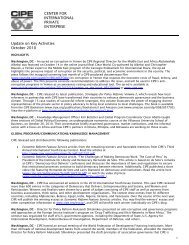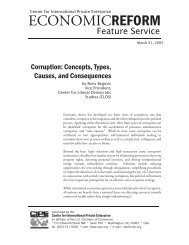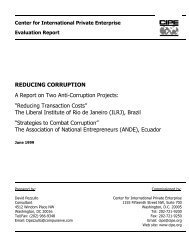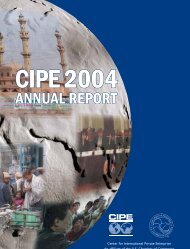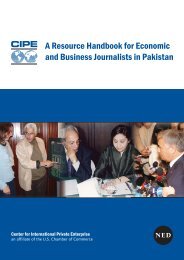Strengthening Democracy and Developing the Private Sector
Strengthening Democracy and Developing the Private Sector
Strengthening Democracy and Developing the Private Sector
Create successful ePaper yourself
Turn your PDF publications into a flip-book with our unique Google optimized e-Paper software.
Center for International <strong>Private</strong> Enterprise<br />
ECONOMICREFORM<br />
Feature Service<br />
<strong>Streng<strong>the</strong>ning</strong> <strong>Democracy</strong> <strong>and</strong><br />
<strong>Developing</strong> <strong>the</strong> <strong>Private</strong> <strong>Sector</strong>:<br />
Seven Years of Reform in Montenegro<br />
Interview with Petar Ivanovic, Ph.D.<br />
Vice President, Montenegro Business Alliance (MBA)<br />
<strong>and</strong> Ralph Marlatt, CAE<br />
Project Manager, CIPE Montenegro<br />
®<br />
February 28, 2006<br />
Following <strong>the</strong> fall of <strong>the</strong> Milosevic regime, <strong>the</strong> government of Montenegro was presented with<br />
<strong>the</strong> opportunity to become an example of stability <strong>and</strong> growth in <strong>the</strong> Balkans. While restricted<br />
by short-term political uncertainty as it redefined its relationship with Serbia, Montenegro<br />
began moving ahead with crucial elements of its reform program targeted at stabilizing its<br />
economy <strong>and</strong> preparing for regional <strong>and</strong> international trade <strong>and</strong> competition.<br />
Beginning in <strong>the</strong> late 1990s, two private sector organizations emerged in Montenegro as an<br />
important part of this process of developing a private sector-based economy <strong>and</strong> streng<strong>the</strong>ning<br />
democratic participatory mechanisms. The Center for Entrepreneurship <strong>and</strong> Economic<br />
Development (CEED) was established to build awareness of <strong>the</strong> benefits of economic freedom<br />
<strong>and</strong> free entrepreneurship in an open <strong>and</strong> democratic society. Working with CIPE <strong>and</strong> <strong>the</strong><br />
local business community, CEED also helped establish <strong>the</strong> Montenegro Business Alliance<br />
(MBA), which became Montenegro’s most powerful independent voice for business. CEED<br />
was recently recognized by Atlas Research Economic Foundation for its hard work <strong>and</strong><br />
accomplishments through a 2005 Templeton Freedom Award Grant for Institute Excellence<br />
<strong>and</strong> was awarded second place in <strong>the</strong> Free Market Solutions to Poverty category for its<br />
“Removing <strong>the</strong> Barriers to Doing Business in Montenegro” program<br />
On February 15, 2006, CIPE officially closed its Montenegro office <strong>and</strong> ended its current<br />
programs with MBA <strong>and</strong> CEED. After <strong>the</strong> closing ceremony, CIPE interviewed Project<br />
Manager Ralph Marlatt <strong>and</strong> Vice President of MBA Dr. Petar Ivanovic to highlight <strong>the</strong><br />
program successes achieved over <strong>the</strong> past seven years.<br />
published by <strong>the</strong><br />
Center for International <strong>Private</strong> Enterprise<br />
an affiliate of <strong>the</strong> U.S. Chamber of Commerce<br />
1155 Fifteenth Street NW • Suite 700 • Washington, DC 20005 • USA<br />
ph: (202) 721-9200 • web: www.cipe.org • e-mail: cipe@cipe.org
Center for International <strong>Private</strong> Enterprise<br />
<strong>Streng<strong>the</strong>ning</strong> <strong>Democracy</strong> <strong>and</strong> <strong>Developing</strong> <strong>the</strong> <strong>Private</strong> <strong>Sector</strong><br />
Introduction<br />
During <strong>the</strong> 1990s, <strong>the</strong> Republic of Montenegro<br />
struggled to establish itself as an outpost of economic<br />
reform <strong>and</strong> democratic development in <strong>the</strong> Federal<br />
Republic of Yugoslavia. Faced with economic <strong>and</strong><br />
political opposition from <strong>the</strong> Belgrade regime of<br />
Slobodan Milosevic, <strong>the</strong> tiny republic has been<br />
struggling to develop its own institutions in an<br />
attempt to insulate itself from <strong>the</strong> disastrous effects<br />
of Milosevic’s isolationist <strong>and</strong> self-serving rule. A key<br />
element of Montenegrin President Milo Djukanovic’s<br />
government’s strategy to streng<strong>the</strong>n Montenegro’s<br />
economy <strong>and</strong> survive <strong>the</strong> difficult relationship with<br />
Serbia was to develop robust economic institutions <strong>and</strong><br />
effect hard-hitting reforms to streng<strong>the</strong>n <strong>the</strong> private<br />
sector. The importance of private sector ownership <strong>and</strong><br />
control of <strong>the</strong> economy, as well as <strong>the</strong> need to create<br />
sound independent financial institutions around which<br />
such an economy could flourish, were <strong>the</strong> priorities<br />
upon which <strong>the</strong> government developed its program of<br />
reforms.<br />
Following <strong>the</strong> fall of <strong>the</strong> Milosevic regime, <strong>the</strong><br />
government of Montenegro faced a new era of stability<br />
<strong>and</strong> growth. While restricted by short-term political<br />
uncertainty as it redefined its relationship with Serbia,<br />
Montenegro began moving ahead with crucial elements<br />
of its reform program targeted at stabilizing its economy<br />
<strong>and</strong> preparing for regional <strong>and</strong> international trade <strong>and</strong><br />
competition.<br />
Beginning in <strong>the</strong> late 1990s, two private sector<br />
organizations emerged as an important part of<br />
this process of developing a private sector-based<br />
economy <strong>and</strong> streng<strong>the</strong>ning democratic participatory<br />
mechanisms. The Center for Entrepreneurship <strong>and</strong><br />
Economic Development (CEED) was established by two<br />
Economics professors of <strong>the</strong> University of Podgorica to<br />
help entrepreneurs in Montenegro achieve a st<strong>and</strong>ard of<br />
excellence in every aspect of business. CEED developed<br />
programs, projects, <strong>and</strong> activities that promoted <strong>and</strong><br />
practically implemented <strong>the</strong> ideas of a free market,<br />
entrepreneurship, <strong>and</strong> private ownership in an open<br />
<strong>and</strong> democratic society based on <strong>the</strong> rule of law. CEED<br />
was established to educate individuals about <strong>the</strong> tools of<br />
a market economy <strong>and</strong> private sector <strong>and</strong> to place <strong>the</strong>se<br />
individuals within private sector institutions where<br />
<strong>the</strong>y could put those tools to work (such as business<br />
associations) <strong>and</strong> build solid organizations capable of<br />
responding to <strong>the</strong> market needs of Montenegro.<br />
Working with CIPE <strong>and</strong> <strong>the</strong> local business<br />
community, CEED also helped establish <strong>the</strong><br />
Montenegro Business Alliance (MBA), which became<br />
Montenegro’s most powerful independent voice for<br />
business, advocating for market reforms <strong>and</strong> private<br />
sector growth. On February 15, 2006, CIPE officially<br />
closed its Montenegro office <strong>and</strong> ended its current<br />
programs with MBA <strong>and</strong> CEED. After <strong>the</strong> closing<br />
ceremony, CIPE interviewed Project Manager Ralph<br />
Marlatt <strong>and</strong> Vice President of MBA Dr. Petar Ivanovic<br />
to highlight <strong>the</strong> program successes achieved over <strong>the</strong><br />
past seven years.<br />
Interview with Dr. Ivanovic <strong>and</strong> Mr. Marlatt<br />
CIPE: How would you describe <strong>the</strong> state of affairs in<br />
Montenegro when CIPE first opened an office <strong>the</strong>re in<br />
1999 What were <strong>the</strong> major challenges faced by <strong>the</strong><br />
business community<br />
Dr. Ivanovic <strong>and</strong> Mr. Marlatt: Back in 1999, more<br />
than 60% of <strong>the</strong> Montenegrin economy operated<br />
in <strong>the</strong> informal sector. The Chamber of Economy<br />
of Montenegro was <strong>the</strong> single voice of business,<br />
<strong>and</strong> it represented mainly <strong>the</strong> large state-owned<br />
companies. What Montenegro really lacked was<br />
business associations that would represent small- <strong>and</strong><br />
medium-sized companies. Fur<strong>the</strong>r, freedom of <strong>the</strong><br />
press was lacking. The media outlets were all stateowned,<br />
<strong>and</strong> it was hard to get reporters to concentrate<br />
on business issues <strong>and</strong> cover economic problems of <strong>the</strong><br />
country on a consistent basis. Moreover, even if <strong>the</strong>y<br />
wanted to cover business <strong>and</strong> economic issues, many<br />
journalists did not have adequate training to do so. The<br />
government tended towards a centralized model, <strong>and</strong><br />
while privatization process was in full swing, <strong>the</strong>re was<br />
no effort to privatize large state-owned companies.<br />
On <strong>the</strong> ground, it was difficult to operate a legitimate<br />
business, because <strong>the</strong>re was no legal framework in<br />
place. The enforcement of laws was weak, <strong>and</strong> one of<br />
<strong>the</strong> biggest problems faced by <strong>the</strong> private sector was <strong>the</strong><br />
– 2 –
<strong>Streng<strong>the</strong>ning</strong> <strong>Democracy</strong> <strong>and</strong> <strong>Developing</strong> <strong>the</strong> <strong>Private</strong> <strong>Sector</strong><br />
Center for International <strong>Private</strong> Enterprise<br />
selective application of tax legislation. Some taxes were<br />
severely prohibitive; for example, <strong>the</strong>re was a 100%<br />
wage tax in place. There was little trust in <strong>the</strong> banking<br />
system, which was in disarray at <strong>the</strong> time.<br />
Most importantly, <strong>the</strong>re was no working partnership<br />
between <strong>the</strong> business community on one h<strong>and</strong> <strong>and</strong> <strong>the</strong><br />
government of Montenegro on <strong>the</strong> o<strong>the</strong>r. This lack of<br />
cooperation between <strong>the</strong> two sides resulted in inefficient<br />
legislation <strong>and</strong> poor implementation of new laws. The<br />
outlook for <strong>the</strong> future was not very bright.<br />
CIPE: What would you say about <strong>the</strong> economic<br />
environment <strong>and</strong> <strong>the</strong> state of democratic development<br />
today, seven years later What are <strong>the</strong> major<br />
improvements<br />
Dr. Ivanovic <strong>and</strong> Mr. Marlatt: Starting in 1999, <strong>the</strong><br />
government of Montenegro introduced a comprehensive<br />
program of economic reforms. The program has<br />
had its ups <strong>and</strong> downs, running into difficulties due<br />
to inconsistent political commitment to reforms.<br />
Never<strong>the</strong>less, <strong>the</strong> economic environment has improved<br />
today, mainly because major privatization activities are<br />
now completed. A legal framework is in place, which<br />
includes <strong>the</strong> Securities Law, <strong>the</strong> Enterprise Law, <strong>and</strong><br />
<strong>the</strong> Accounting Law; tax reform has been successfully<br />
carried out. Businesspeople have more confidence<br />
in <strong>the</strong> banking <strong>and</strong> securities system now that major<br />
banking reform has taken place.<br />
There has been a reduction in <strong>the</strong> size of <strong>the</strong> informal<br />
sector <strong>and</strong> procedures for business registration <strong>and</strong><br />
operation are now transparent <strong>and</strong> known in advance.<br />
Thanks to <strong>the</strong> ECO Press Club founded by <strong>the</strong> Center<br />
for Entrepreneurship <strong>and</strong> Economic Development<br />
(CEED), more economic reporters are now able to<br />
give a balanced view of economic news <strong>and</strong> business<br />
matters. As a direct result of <strong>the</strong> ECO Press Club, <strong>the</strong><br />
major newspapers in Montenegro now have at least one<br />
page or even a regular weekly appendix dedicated to<br />
business <strong>and</strong> financial news.<br />
Since <strong>the</strong> MBA was established in September 2001,<br />
<strong>the</strong>re has been visible growth in business participation<br />
in policymaking <strong>and</strong>, more importantly, we are seeing<br />
positive results of that participation for both <strong>the</strong><br />
government <strong>and</strong> <strong>the</strong> private sector. For example, new<br />
laws that were drafted in cooperation with <strong>the</strong> private<br />
sector are now implemented with greater ease. Though<br />
modest, tax reduction is taking place, <strong>and</strong> it is building<br />
trust between <strong>the</strong> government <strong>and</strong> <strong>the</strong> business<br />
community. Taxes on labor have been reduced by 10%<br />
<strong>and</strong> <strong>the</strong> corporate tax was reduced to 9%, which is <strong>the</strong><br />
lowest rate in Europe. In general, <strong>the</strong> most important<br />
improvement is related to <strong>the</strong> increased overall trust<br />
in <strong>the</strong> business environment in Montenegro, which<br />
is becoming more stable <strong>and</strong> more predictable. As a<br />
result, over 1,300 foreign firms are doing business in<br />
Montenegro today.<br />
CIPE: The “National Business Agenda” produced by<br />
<strong>the</strong> Montenegro Business Alliance (MBA) has become<br />
quite a success. Can you describe <strong>the</strong> major aspects of<br />
<strong>the</strong> business agenda How has it helped <strong>the</strong> business<br />
community<br />
Dr. Ivanovic <strong>and</strong> Mr. Marlatt: The National Business<br />
Agenda (NBA) produced by <strong>the</strong> MBA has been a<br />
major force for change in <strong>the</strong> business community.<br />
The business agenda is a grassroots document that<br />
was developed with <strong>the</strong> input of <strong>the</strong> members of <strong>the</strong><br />
Alliance. The process is as follows: first, a questionnaire<br />
is distributed at <strong>the</strong> Annual Assembly Meeting in<br />
September. The responses are tabulated <strong>and</strong> given to<br />
CEED for fur<strong>the</strong>r analysis. Once major issues facing<br />
<strong>the</strong> business community are identified, polls are taken<br />
to broaden <strong>the</strong> agenda, <strong>and</strong> follow-up questions are<br />
distributed to explore issues of concern in more detail.<br />
CEED reports its findings to <strong>the</strong> MBA through <strong>the</strong><br />
Education <strong>and</strong> Research Committee. The committee<br />
reviews <strong>the</strong> findings <strong>and</strong> submits final recommendations<br />
to <strong>the</strong> MBA Board of Directors. The board members<br />
debate <strong>the</strong> issues <strong>and</strong> make suggestions regarding<br />
modifications in <strong>the</strong> policy issues that have surfaced.<br />
After receiving <strong>the</strong> board’s approval, <strong>the</strong> National<br />
Business Agenda is submitted to <strong>the</strong> MBA members<br />
for comment. The board votes on a final version of<br />
<strong>the</strong> Agenda, <strong>and</strong> it is submitted to <strong>the</strong> members at <strong>the</strong><br />
winter board meeting <strong>the</strong> following year.<br />
The National Business Agenda consists of 7 broad<br />
challenges that are submitted to MBA commissions<br />
– 3 –
Center for International <strong>Private</strong> Enterprise<br />
<strong>Streng<strong>the</strong>ning</strong> <strong>Democracy</strong> <strong>and</strong> <strong>Developing</strong> <strong>the</strong> <strong>Private</strong> <strong>Sector</strong><br />
<strong>and</strong> special interest groups to develop specific action<br />
that will be taken by <strong>the</strong> MBA to implement <strong>the</strong> NBA.<br />
Agendas have been produced by <strong>the</strong> MBA in 2003,<br />
2004, <strong>and</strong> 2005, <strong>and</strong> one is currently being prepared<br />
for 2006.<br />
This whole process is very important because it<br />
involves as many members as possible <strong>and</strong> effectively<br />
shapes <strong>the</strong> main challenges facing <strong>the</strong> private sector.<br />
Actually, this is <strong>the</strong> best way to avoid any disagreements<br />
or potential conflicts between <strong>the</strong> members about <strong>the</strong><br />
importance of different issues or problems that need to<br />
be resolved.<br />
The National Business Agenda has been a major<br />
help to <strong>the</strong> business community. The first NBA was<br />
published in 2003, <strong>and</strong> <strong>the</strong> government of Montenegro<br />
made sections of <strong>the</strong> Agenda a part of its economic<br />
reform package. The NBA has addressed <strong>the</strong> company<br />
registration <strong>and</strong> licensing laws, wage tax <strong>and</strong> corporate<br />
tax reform, <strong>and</strong> <strong>the</strong> privatization of <strong>the</strong> energy sector to<br />
allow small business owners to provide electric power in<br />
rural areas. The issues dealing with <strong>the</strong> gray economy<br />
have been addressed, as well as <strong>the</strong> reduction of red<br />
tape. The Agenda promotes improving <strong>the</strong> conditions<br />
for doing business in <strong>the</strong> tourism <strong>and</strong> wood-processing<br />
sectors. The Agenda has also supported improvement<br />
in <strong>the</strong> area of customs laws with <strong>the</strong> intention of<br />
increase competition.<br />
If one were to take a look at <strong>the</strong> business environment<br />
in Montenegro today, it would be impossible to fail to<br />
see <strong>the</strong> many significant improvements. For example,<br />
today Montenegro is recognized as a champion in <strong>the</strong><br />
region for business registration. You can register your<br />
firm in Montenegro within four working days by<br />
submitting no more than three documents (all available<br />
on <strong>the</strong> government <strong>the</strong> web site) <strong>and</strong> with a founding<br />
capital of one euro. The next challenge, which we have<br />
already begun to address, is implementing a mechanism<br />
for on-line business registration.<br />
CIPE: What impact has <strong>the</strong> business agenda process<br />
had on democratic institutions in <strong>the</strong> country, mainly<br />
on <strong>the</strong> relationship between <strong>the</strong> business community<br />
<strong>and</strong> <strong>the</strong> government of Montenegro<br />
Dr. Ivanovic <strong>and</strong> Mr. Marlatt: As a direct result of<br />
<strong>the</strong> National Business Agenda a Memor<strong>and</strong>um of<br />
Underst<strong>and</strong>ing (MoU) was signed by <strong>the</strong> Parliament<br />
<strong>and</strong> <strong>the</strong> MBA, allowing MBA staff <strong>and</strong> members to<br />
testify on issues of concern to <strong>the</strong> business community<br />
before MPs. As a follow-up, <strong>the</strong> Organization for<br />
Security <strong>and</strong> Co-operation in Europe (OSCE) recently<br />
signed an MoU with <strong>the</strong> MBA under which <strong>the</strong> MBA<br />
will have one staff member present on a daily basis in<br />
<strong>the</strong> Parliament, explaining to MPs <strong>the</strong> importance <strong>and</strong><br />
purpose of <strong>the</strong> laws submitted for adoption.<br />
Several public-private partnerships have been<br />
formed whereby <strong>the</strong> MBA <strong>and</strong> <strong>the</strong> business community<br />
work toge<strong>the</strong>r with government to initiate legislation.<br />
Examples of <strong>the</strong>se partnerships include <strong>the</strong> Council<br />
on Economic Freedom <strong>and</strong> <strong>the</strong> agreement between<br />
<strong>the</strong> MBA <strong>and</strong> <strong>the</strong> Ministry of Finance to meet on a<br />
regular basis to discuss <strong>the</strong> business community’s issues<br />
of concern. Because of <strong>the</strong> NBA, <strong>the</strong> MBA now works<br />
directly with <strong>the</strong> Tax Ministry to resolve problems with<br />
<strong>the</strong> tax police. A Labor-Government Task Force was<br />
also formed.<br />
CIPE: How has MBA improved during its nearly five<br />
years of existence What have been <strong>the</strong> major internal<br />
(organizational) improvements What kind of impact<br />
did it have on membership<br />
Dr. Ivanovic <strong>and</strong> Mr. Marlatt: The MBA was organized<br />
by 10 founding members in September 2001. The<br />
north <strong>and</strong> south of Montenegro were represented, <strong>and</strong><br />
members of all major religions – including Orthodox,<br />
Muslim, Catholic, <strong>and</strong> Jews – were present on <strong>the</strong><br />
original board of directors. With a dedicated <strong>and</strong> welltrained<br />
staff, <strong>the</strong> MBA began to grow. It took a crossborder<br />
business-to-business trip to Kosovo in April<br />
2002 to bring <strong>the</strong> membership toge<strong>the</strong>r <strong>and</strong> begin<br />
to trust one ano<strong>the</strong>r. On that six-hour bus ride, <strong>the</strong><br />
businesspeople began to talk with one ano<strong>the</strong>r, <strong>and</strong><br />
<strong>the</strong>y realized that <strong>the</strong>y had similar problems. As a result<br />
of that trip to Kosovo, more than one million euros in<br />
deals were signed, <strong>and</strong> those in attendance told o<strong>the</strong>rs<br />
about its success.<br />
Over <strong>the</strong> years, MBA staff began organizing special<br />
interest groups <strong>and</strong> initiatives on specific business-related<br />
– 4 –
<strong>Streng<strong>the</strong>ning</strong> <strong>Democracy</strong> <strong>and</strong> <strong>Developing</strong> <strong>the</strong> <strong>Private</strong> <strong>Sector</strong><br />
Center for International <strong>Private</strong> Enterprise<br />
Box 1. Policy Accomplishments of <strong>the</strong> MBA<br />
The MBA <strong>and</strong> CEED are leaders in promoting advocacy <strong>and</strong> in advocating issues crucial to Montenegro’s<br />
economic development. Their method of work was most often to explain <strong>the</strong> economic logic underlying <strong>the</strong><br />
new laws <strong>and</strong> find creative means to bring about less expensive <strong>and</strong> shorter, more user-friendly means of doing<br />
business. The following are a set of laws central to Montenegro’s economic development on which CEED <strong>and</strong><br />
<strong>the</strong> MBA worked extensively throughout this 7-year period:<br />
• Securities Papers Law (passed in November 2000): Based on this law, <strong>the</strong>re are now two stock exchanges<br />
<strong>and</strong> six brokerage houses in Montenegro.<br />
• Corporate Profit Tax Law (passed in December 2001, <strong>and</strong> amendments to <strong>the</strong> law passed in 2004): The<br />
final result is that now in Montenegro <strong>the</strong>re is a flat 9% corporate tax - <strong>the</strong> lowest in Europe.<br />
• The Enterprise Law (passed in January 2002): Under this law, it now takes four days <strong>and</strong> one euro to<br />
register a firm, while previously it took up to 5,000 euros <strong>and</strong> more than 45 working days. The new law<br />
treats entrepreneurs as legal subjects; as a result today over 15,000 entrepreneurs <strong>and</strong> 13,000 o<strong>the</strong>r legal<br />
subjects have registered. The MBA <strong>and</strong> CEED helped over 4,000 companies register free of charge.<br />
• Accounting Law (passed in January 2002): This new law adopted international accounting st<strong>and</strong>ards<br />
(IAS). MBA also received a seat on <strong>the</strong> Institute of Accounting <strong>and</strong> Auditing board of directors.<br />
• Bankruptcy Law (passed in January 2002): The impact of this law is that it simplified <strong>the</strong> procedure for<br />
declaring bankruptcy <strong>and</strong> reduced <strong>the</strong> costs to all concerned.<br />
• <strong>Private</strong> <strong>Sector</strong> Participation in Delivering Public Services (passed in May 2002): Under this law, <strong>the</strong><br />
private sector was allowed to deliver services <strong>and</strong> participate in works that had previously been <strong>the</strong> sole<br />
prerogative of <strong>the</strong> state government <strong>and</strong> municipalities (such as public transportation, for example).<br />
• Customs Law (passed in December 2002): The CEED/MBA draft law was turned down because <strong>the</strong>y<br />
proposed a reduction in <strong>the</strong> customs rate.<br />
• Energy Law (passed in May 2003): The main CEED <strong>and</strong> MBA contribution to this very technical law<br />
was to include <strong>the</strong> possibility for private sector investment in small hydro plants - an option that was not<br />
possible under <strong>the</strong> old energy law. As a result, because of <strong>the</strong> new law two companies have invested <strong>the</strong>ir<br />
capital in this field.<br />
• Accounting Law (passed in December 2005): After a strong advocacy campaign, amendments to<br />
<strong>the</strong> Accounting Law were passed. In addition to bringing <strong>the</strong> law into compliance with international<br />
accounting st<strong>and</strong>ards, it provided for no exemptions from test requirements to become an auditor.<br />
• Licensing Law (passed in December of 2005): The purpose of this draft law is to simplify <strong>the</strong> registration<br />
procedure at <strong>the</strong> local level. The MBA will continue to work on streng<strong>the</strong>ning this law throughout 2006.<br />
• Labor Law: MBA will continue to seek labor law reform in 2006.<br />
• Concession Law; Property Rights Law; Communal Tax Law: MBA is a member of <strong>the</strong> Council on<br />
Economic Freedom. This group meets regularly to discuss a strategy to ensure that <strong>the</strong>se laws are adopted.<br />
This public/private partnership of business <strong>and</strong> government representatives will pursue passage of <strong>the</strong>se<br />
laws in 2006.<br />
– 5 –
Center for International <strong>Private</strong> Enterprise<br />
<strong>Streng<strong>the</strong>ning</strong> <strong>Democracy</strong> <strong>and</strong> <strong>Developing</strong> <strong>the</strong> <strong>Private</strong> <strong>Sector</strong><br />
issues <strong>and</strong>, as a result, more members became active in<br />
<strong>the</strong> Alliance’s programs. The MBA offices that were<br />
opened in Kotor, Ulcinj, Bar, Herceg Novi, <strong>and</strong> Niksic<br />
mobilized <strong>the</strong> business community in those parts of<br />
Montenegro. The staff became more sophisticated with<br />
direct advocacy <strong>and</strong> began to contact <strong>the</strong> Parliament,<br />
Ministries, <strong>and</strong> senior government officials on a regular<br />
basis. The staff engaged <strong>the</strong> electronic <strong>and</strong> print media<br />
at every opportunity, <strong>and</strong> membership grew because of<br />
<strong>the</strong> publicity that <strong>the</strong> MBA was receiving. The MBA<br />
has become known as an action-oriented organization<br />
that knows how to get things done. All major foreign<br />
companies operating in Montenegro are now members<br />
of <strong>the</strong> MBA, along with <strong>the</strong> major Montenegrin firms.<br />
At <strong>the</strong> present time, <strong>the</strong> MBA has over 450 dues-paying<br />
members.<br />
The MBA’s “Business Directory” (membership<br />
directory) is fully supported by ads placed in <strong>the</strong><br />
publication. Ano<strong>the</strong>r MBA publication, “ContactInfo,”<br />
lists all <strong>the</strong> MPs <strong>and</strong> ministers as well as o<strong>the</strong>r associations<br />
<strong>and</strong> <strong>the</strong> media that could be of interest to people doing<br />
business in <strong>the</strong> region. These publications are widely<br />
used by MBA members, as well as <strong>the</strong> newsletter MBA<br />
Business Insider, <strong>and</strong> <strong>the</strong> annual report.<br />
The board meets on a regular basis <strong>and</strong> <strong>the</strong> general<br />
assembly meets twice a year. Election of <strong>the</strong> board is<br />
open <strong>and</strong> transparent; after a nominating process, <strong>the</strong><br />
list of c<strong>and</strong>idates is submitted to <strong>the</strong> members, <strong>and</strong> a<br />
secret ballot is taken at <strong>the</strong> September assembly meeting.<br />
Once <strong>the</strong> board is elected, it meets to elect a president<br />
<strong>and</strong> vice president, <strong>and</strong> votes to select an executive<br />
director. This strong organization <strong>and</strong> transparency<br />
continues to attract new members <strong>and</strong> retain current<br />
ones.<br />
CIPE: What are <strong>the</strong> next steps for <strong>the</strong> MBA<br />
Dr. Ivanovic <strong>and</strong> Mr. Marlatt: The MBA will continue<br />
to play a major role in uniting <strong>the</strong> business community<br />
at both <strong>the</strong> national <strong>and</strong> local levels. Through specific<br />
initiatives, MBA commissions <strong>and</strong> special interest<br />
groups will mobilize more active members. The MBA<br />
will work on issues at <strong>the</strong> local level through satellite<br />
offices <strong>and</strong> sister associations. The two main goals<br />
of <strong>the</strong> MBA are to have members representing 1,000<br />
respected private companies by 2010 <strong>and</strong> to change <strong>the</strong><br />
law to allow <strong>the</strong> formation of business associations <strong>and</strong><br />
private chambers of commerce to be organized.<br />
The MBA will work more closely with surrounding<br />
countries to develop cross-border trade through<br />
business-to-business conferences. The MBA will<br />
work with similar organizations in <strong>the</strong> Balkan region<br />
to initiate a free-trade zone in <strong>the</strong> Balkans, <strong>and</strong> change<br />
<strong>the</strong> tax <strong>and</strong> tariff laws in Montenegro <strong>and</strong> surrounding<br />
countries, which will lead to a Balkan trading block.<br />
CIPE: Can you talk about <strong>the</strong> model of business<br />
consulting services of CEED How did you get it<br />
started What were <strong>the</strong> main challenges What kind of<br />
services do you provide<br />
Dr. Ivanovic <strong>and</strong> Mr. Marlatt: The rationale for<br />
establishing CEED was to fill <strong>the</strong> gap in knowledge<br />
required by pioneering entrepreneurs who emerged<br />
after <strong>the</strong> break-up of <strong>the</strong> former Yugoslavia. It quickly<br />
became evident that most of <strong>the</strong>se entrepreneurs required<br />
practical <strong>and</strong> tailor-made training to facilitate <strong>the</strong>ir<br />
business start-up <strong>and</strong> expansion. CEED has rapidly<br />
established itself as <strong>the</strong> core center for entrepreneurship<br />
training in Montenegro. The first seminars offered<br />
solutions to <strong>the</strong> following issues: how to start a business;<br />
how to prepare business plan; how to acquire financing<br />
for SMEs; how to follow proper accounting procedures<br />
in an SME; <strong>and</strong> how to use <strong>the</strong> Internet effectively in<br />
business. Today, after more than 10 years, CEED is<br />
offering a wide range of services <strong>and</strong> is cooperating<br />
with a large number of international institutions within<br />
its program activities. With more <strong>the</strong>n 200 clients<br />
in Montenegro <strong>and</strong> relationships with international<br />
organizations, <strong>the</strong> Center for Entrepreneurship <strong>and</strong><br />
Economic Development has developed a reputation as<br />
a reliable partner.<br />
The main challenge was to build a trusting<br />
relationship with clients <strong>and</strong> persuade <strong>the</strong>m that<br />
outside consultancy can be helpful for <strong>the</strong> development<br />
of <strong>the</strong>ir business’ growth <strong>and</strong> direction. CEED did<br />
this by sharing <strong>the</strong> risks with its clients: minimal fixed<br />
costs <strong>and</strong> a “success fee” charged once when <strong>the</strong> job was<br />
completed were ra<strong>the</strong>r attractive. Also, CEED proved<br />
to have a team of young <strong>and</strong> dedicated bright people<br />
– 6 –
<strong>Streng<strong>the</strong>ning</strong> <strong>Democracy</strong> <strong>and</strong> <strong>Developing</strong> <strong>the</strong> <strong>Private</strong> <strong>Sector</strong><br />
Center for International <strong>Private</strong> Enterprise<br />
Box 2. Approaches to Reform in<br />
Montenegro: Lessons Learned<br />
Step 1: Develop human capital (raise <strong>the</strong> next<br />
generation of reform leaders)<br />
Step 2: Create a National Business Agenda <strong>and</strong><br />
institutionalize advocacy as means of<br />
an open reform process <strong>and</strong> building a<br />
better environment for doing business<br />
Step 3: CEED as business services provider to<br />
firms<br />
Step 4: Become a “go to” group in Montenegro<br />
~ John D. Sullivan, CIPE Executive Director,<br />
remarks at <strong>the</strong> February 15th event in Montenegro<br />
responsive to <strong>the</strong>ir client’s immediate needs. Also,<br />
cultivating strategic partnerships ra<strong>the</strong>r than taking on<br />
one-time-jobs is CEED’s main recommendation for<br />
success.<br />
Gradually, CEED became a qualified organization<br />
capable of performing different tasks, such as:<br />
development of business plans <strong>and</strong> feasibility studies,<br />
company presentations, investors prospectus,<br />
financial restructuring, organizational restructuring,<br />
marketing plans, market research surveys, due diligence<br />
performance, strategic plans, investment plans,<br />
bankruptcy reorganization plans, <strong>and</strong> general plans for<br />
presentation to financial institutions.<br />
CIPE: What about research on <strong>and</strong> analysis of businessrelated<br />
issues What have been CEED’s major products<br />
in that area What is <strong>the</strong> impact<br />
Dr. Ivanovic <strong>and</strong> Mr. Marlatt: CEED divided its<br />
activities into two parts: (i) consulting with <strong>the</strong> aim to<br />
insure sustainability of <strong>the</strong> organization <strong>and</strong> (ii) research<br />
<strong>and</strong> advocacy with <strong>the</strong> aim to have an influence on <strong>the</strong><br />
reform <strong>and</strong> improvement of <strong>the</strong> business environment.<br />
In 2000, CEED started to produce its report titled<br />
Barriers to Doing Business in Montenegro; it was<br />
immediately recognized as powerful tool not only for<br />
identifying <strong>the</strong> problems, but for offering alternatives<br />
in <strong>the</strong> search for solutions. Over time this study<br />
became both a monitoring tool (meaning to register ex<br />
post what was changed) <strong>and</strong> a very atypical guide for ex<br />
ante activities in order to remove some of <strong>the</strong> barriers.<br />
As a result, many barriers (such as high customs,<br />
complicated procedures, costly business registration,<br />
etc.) were removed. Also, by promoting <strong>the</strong> most<br />
successful firms in Montenegro through <strong>the</strong> rating lists,<br />
CEED managed to have an influence on <strong>the</strong> adoption<br />
of higher business st<strong>and</strong>ards.<br />
In general, through its research <strong>and</strong> advocacy<br />
activities, CEED helped to build awareness of <strong>the</strong><br />
benefits of economic freedom <strong>and</strong> free entrepreneurship<br />
in Montenegro. After all, CEED’s overall success in<br />
contributing to <strong>the</strong> public’s underst<strong>and</strong>ing of how<br />
to build a free society was recently recognized by<br />
Atlas Research Economic Foundation: CEED won a<br />
2005 Templeton Freedom Award Grant for Institute<br />
Excellence <strong>and</strong> second place in <strong>the</strong> Free Market<br />
Solutions to Poverty for its “Removing <strong>the</strong> Barriers to<br />
Doing Business in Montenegro” program.<br />
CIPE: What can o<strong>the</strong>r countries take away from <strong>the</strong><br />
MBA’s <strong>and</strong> CEED’s experience in streng<strong>the</strong>ning<br />
participatory (democratic) mechanisms <strong>and</strong> promoting<br />
economic reform in Montenegro<br />
Dr. Ivanovic <strong>and</strong> Mr. Marlatt: O<strong>the</strong>r countries can learn<br />
that it is necessary to take “baby steps” at first. They<br />
can learn that in a democracy, citizens have <strong>the</strong> right<br />
to criticize <strong>the</strong> government, but it is more constructive<br />
to offer an alternative solution along with <strong>the</strong> critique.<br />
Business organizations should partner with think tanks<br />
in order to develop substantive goals <strong>and</strong> strategic plans<br />
to improve <strong>the</strong> business environment. This type of<br />
active participation will get business people involved in<br />
<strong>the</strong> decision-making process. They should engaged in<br />
cross-border business-to-business trade forums. One<br />
of <strong>the</strong> most important lessons businesspeople <strong>and</strong><br />
policymakers can learn from Montenegro is to set an<br />
achievable business policy agenda with a strategy for<br />
implementation to effect change.<br />
Businesspeople can only accomplish <strong>the</strong>se things<br />
if <strong>the</strong>y have a firm belief that it is possible to achieve<br />
– 7 –
Center for International <strong>Private</strong> Enterprise<br />
<strong>Streng<strong>the</strong>ning</strong> <strong>Democracy</strong> <strong>and</strong> <strong>Developing</strong> <strong>the</strong> <strong>Private</strong> <strong>Sector</strong><br />
reform. It is necessary for businessmen <strong>and</strong> women<br />
to have an optimistic outlook. If <strong>the</strong>y believe things<br />
will improve, <strong>the</strong>y will improve. They can learn<br />
from Montenegro that it is important to underst<strong>and</strong><br />
globalization – no country today can operate in a<br />
vacuum.<br />
The Montenegro Business Alliance has become<br />
known as <strong>the</strong> private chamber of commerce in<br />
Montenegro <strong>and</strong> was <strong>the</strong> first umbrella association<br />
organized <strong>the</strong>re. O<strong>the</strong>r business associations have also<br />
been established at <strong>the</strong> national <strong>and</strong> local levels. There is<br />
a greater trust among businesspeople <strong>and</strong> a willingness<br />
to work with <strong>the</strong> government.<br />
Being specific, focused, proactive, <strong>and</strong> at <strong>the</strong> same<br />
time being well connected to <strong>the</strong> major think tanks,<br />
capable intellectuals, <strong>and</strong> those that are creating future<br />
leaders - that is <strong>the</strong> secret of MBA success.<br />
__________________________________________<br />
Dr. Petar Ivanovic is <strong>the</strong> Director of <strong>the</strong> Montenegrin<br />
Investment Promotion Agency (MIPA), <strong>the</strong> Vice President<br />
of <strong>the</strong> Montenegro Business Alliance (MBA), <strong>and</strong> a professor<br />
at <strong>the</strong> School of Economics in Podgorica. He is one of <strong>the</strong><br />
founders of <strong>the</strong> MBA, which is <strong>the</strong> first private chamber<br />
of commerce in Montenegro. He has managed over 10<br />
international projects, including projects in Afghanistan<br />
<strong>and</strong> Kosovo, <strong>and</strong> he has managed over 50 different projects<br />
<strong>and</strong> surveys in Montenegro.<br />
In 1994, toge<strong>the</strong>r with Professor Veselin Vukotic, Dr.<br />
Ivanovic founded <strong>the</strong> Center for Entrepreneurship <strong>and</strong><br />
Economic Development – CEED. He also cooperated<br />
with Dr. Vukotic to found <strong>the</strong> Institute for Strategic Studies<br />
<strong>and</strong> Prognoses (ISSP) in 1998 <strong>and</strong> <strong>the</strong> Center for Applied<br />
Research <strong>and</strong> Analysis (CARA). He has over 21 years of<br />
experience in <strong>the</strong> private sector, including work as CEO<br />
of Economic Reform Network, which consists of three<br />
abovementioned organizations.<br />
In addition, Dr. Ivanovic was one of <strong>the</strong> founders of<br />
<strong>the</strong> Group 17, which was established to support student<br />
protests in Serbia against <strong>the</strong> Milosevic regime. He has<br />
published two books, one textbook, <strong>and</strong> over 75 articles in<br />
Yugoslavia <strong>and</strong> abroad.<br />
Ralph Marlatt, CAE served as <strong>the</strong> Project Manager of<br />
CIPE’s Montenegro office from 1999-2006. During his<br />
tenure, <strong>the</strong> Montenegro Office worked with <strong>the</strong> Center for<br />
Entrepreneurship <strong>and</strong> Economic Development (CEED)<br />
<strong>and</strong> <strong>the</strong> Montenegro Business Alliance (MBA) to build <strong>the</strong><br />
capacity of <strong>the</strong> private sector.<br />
Mr. Marlatt is currently President of RJM Consultants,<br />
an international management <strong>and</strong> marketing company.<br />
With a combined background in <strong>the</strong> public, private, <strong>and</strong><br />
non-profit sectors, he founded RJM Consultants, to provide<br />
leadership training, strategic planning, Board development,<br />
<strong>and</strong> niche marketing of high quality financial <strong>and</strong><br />
specialty products. His company provides international<br />
management consulting <strong>and</strong> marketing services designed to<br />
grow associations <strong>and</strong> businesses globally.<br />
He is a frequent speaker on association management<br />
<strong>and</strong> leadership issues as well as an instructor at <strong>the</strong> Center<br />
for International <strong>Private</strong> Enterprise (CIPE), <strong>and</strong> <strong>the</strong><br />
Institute for Organization Management. He has also served<br />
as Executive Vice President of Olson Management Group,<br />
Inc. <strong>and</strong> President <strong>and</strong> CEO of <strong>the</strong> Insurance Federation<br />
of Minnesota.<br />
The views expressed by <strong>the</strong> author are his own <strong>and</strong> do not<br />
necessarily represent <strong>the</strong> views of <strong>the</strong> Center for International<br />
<strong>Private</strong> Enterprise. The Center for International <strong>Private</strong><br />
Enterprise grants permission to reprint, translate, <strong>and</strong>/or<br />
publish original articles from its Economic Reform Feature<br />
Service provided that (1) proper attribution is given to<br />
<strong>the</strong> original author <strong>and</strong> to CIPE <strong>and</strong> (2) CIPE is notified<br />
where <strong>the</strong> article is placed <strong>and</strong> a copy is provided to CIPE’s<br />
Washington office via mail, e-mail, or fax.<br />
The Center for International <strong>Private</strong> Enterprise is a<br />
non-profit affiliate of <strong>the</strong> U.S. Chamber of Commerce <strong>and</strong><br />
one of <strong>the</strong> four core institutes of <strong>the</strong> National Endowment<br />
for <strong>Democracy</strong>. CIPE has supported more than 800 local<br />
initiatives in over 90 developing countries, involving <strong>the</strong><br />
private sector in policy advocacy <strong>and</strong> institutional reform,<br />
improving governance, <strong>and</strong> building underst<strong>and</strong>ing of<br />
market-based democratic systems. CIPE programs are<br />
also supported through <strong>the</strong> United States Agency for<br />
International Development.<br />
– 8 –


